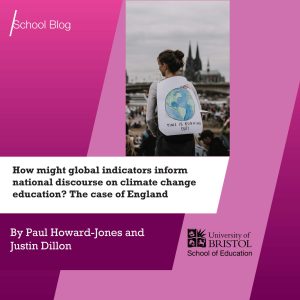 By Paul Howard-Jones and Justin Dillon
By Paul Howard-Jones and Justin Dillon
On April 21st 2022, the UK government published its first education strategy for England on sustainability and climate change. It envisions that, by 2030, “the United Kingdom is the world-leading education sector in sustainability and climate change”.
Many might consider the threat of climate change alone as sufficient grounds for prompting a sense of urgency in educational policy making. However, global competitiveness and national prestige are potent political motivators that often feature in government discourse and policy, and it appears as true for climate change education as it does for other areas.
It could be claimed that the UK kickstarted global industrialisation in the 1700s, along with all its many opportunities and challenges, including the warming of our planet. It might be appropriate, therefore, that the UK wishes to lead education development in this area and such ambition should be applauded. In many respects, it’s exciting and reassuring to think of a world in which nations compete in a virtuous race to improve climate change communication and education (CCE).
